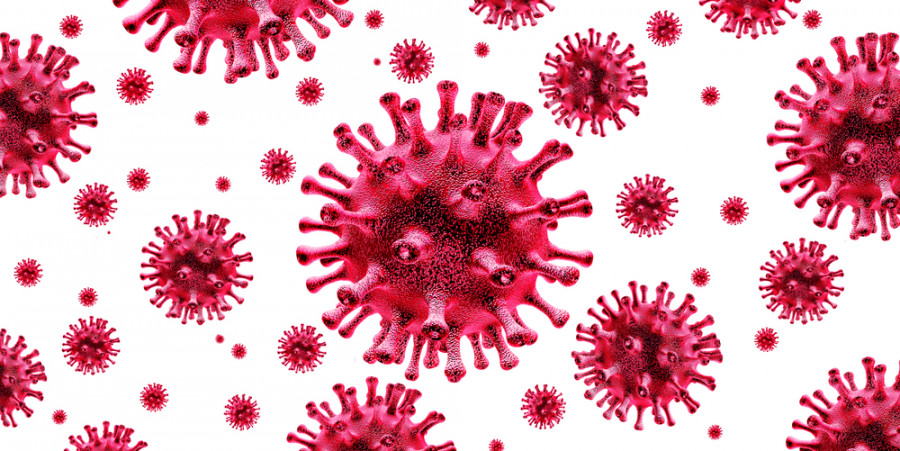A new variant of the coronavirus first detected in the UK has been seen in at least 33 countries around the world, but the authorities in Nepal focus only on the people returning from the UK.
The Covid-19 Crisis Management Center places people returning from the UK to hotel quarantine while making arrivals from other countries home.
“We have asked all people returning from abroad to stay at home in isolation for ten days and those returning from the UK have been placed in hotel quarantine,” Dr Roshan Pokhrel, chief specialist at the Ministry of Health and Population, told the Post. said. “We will make new decisions on the quarantine of people returning from other countries to stakeholder meetings.”
At least 200 people have returned from the UK after the new variant of the coronavirus was detected. Of them, several returnees tested positive for the coronavirus. Swab samples from everyone who tested positive were sent for a sequence test for the entire genome to know if the virus was detected regularly, or the new variant.
Whole-genome sequencing is a comprehensive analysis of the entire DNA sequences of the genes of an organism. Researchers believe that sequencing the entire genome of the coronavirus can help detect the severity and characteristics of the virus.
Public health experts said the authorities concerned were too slow to recognize the level of risk and that their current efforts could not stop the new variant of viruses from entering the country.
“The new variant of the virus has even been detected in China, India and Pakistan,” said Dr. Baburam Marasini, former director of the Division of Epidemiology and Disease Control, told the Post. “Focusing only on the people who return from the UK and let others go home shows that we have learned nothing from our mistakes and failures.”
The British health secretary announced on December 14 that there is a new and highly transmissible coronavirus variant, after laboratories of Covid tests reported that a growing number of their positive samples were missing a signal from one of the three genes they Use PCR tests. confirms the presence of the virus.
On December 22, authorities in Nepal ordered all international airlines not to bring passengers from the UK or those traveling through the country from December 24.
But despite the direction, people are returning to the UK by transport to other countries.
Although the virus has reached more than 33 countries around the world, the authorities focus only on those returning from the UK.
According to the Business Insider, the new variant of coronavirus has been detected in the United Kingdom, the Netherlands, France, Japan, Germany, Spain, Sweden, Switzerland, Denmark, Italy, Canada, Lebanon, Singapore, Australia, the United Arab Emirates, India, South Korea, Finland, Pakistan, the United States, Turkey, Belgium, Chile, Brazil, Malta, Norway, Portugal, China, Taiwan, Iceland, Ireland, Israel and Jordan.
To make matters worse, no one is watching whether the people returning from abroad remain in quarantine or isolation.
Doctors believe the lack of monitoring of the infected people to see if they remain in quarantine is one of the reasons for the high incidence of coronavirus in communities.
“All people returning from abroad must be quarantined, and some institutions must monitor them,” said Dr. Prabhat Adhikari, an expert in infectious diseases and critical care, told the Post. “The authorities must also take initiatives to bring technology to execute the entire genome sequence of the virus.”
In the absence of the facility to conduct sequencing tests for whole genomes in the country, authorities are unaware of whether the virus has entered the country or not.
Much is still known about the new variant because it was detected a few weeks ago, but according to the BBC, the new variant of the virus detected in the UK could be 70 per cent more contagious than others spread around the world.
South Africa is also struggling to contain a new wave of coronavirus infections, possibly linked to a genetic mutation of the virus.
Scientists studying new variants of the virus believe that the South African variant is more contagious than those found in the UK, and that it can affect young people more, and that it is slightly more resistant to existing vaccines. . There are also concerns that the South African variant could “re-infect” people who have already recovered from Covid-19.
Dr Adhikari said that even though the new variant of the virus which is less serious in the UK than usual, many people will be infected, which means that health care institutions will be overwhelmed within a few days as the virus spreads.
“Elderly and people with underlying conditions will be at risk, even if the virus is less severe for other groups,” Adhikari added.
